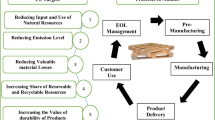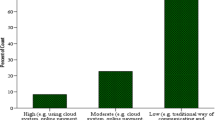Abstract
Digital transformation in supply chains has emerged as a response to minimize disruption risks during the COVID-19 pandemic. While both large and small to medium enterprises (SMEs) are placing considerable effort into digital transformation, the interactions between environmental dynamism, technology, and organizational capabilities, seem to favor the SMEs’ efforts and rapidly close the digital gap between them and large enterprises. This paper is based on the technology-organization-environment framework (TOE) and uses multi-group analysis on 923 firms in Vietnamese to empirically explore this phenomenon. This study found that faster digital transformation uptake could be achieved under the impacts of the TOE three sets of factors. However, SMEs were found to adopt faster technology deployment rates than large enterprises as the pandemic disrupts and resets the adoption path of digital technologies. This study provides crucial implications for both SMEs and large enterprises in their digital transformation.
Access this chapter
Tax calculation will be finalised at checkout
Purchases are for personal use only
Similar content being viewed by others
References
Bosch-Sijtsema, P., et al. (2021). The hype factor of digital technologies in AEC. Construction Innovation, 21(4), 899–916.
MacKenzie, D., Wajcman, J. (1999). The social shaping of technology. Open University Press.
OECD. (2021). The Digital transformation of SMEs.
Awa, H. O., Ojiabo, O. U., & Emecheta, B. C. (2015). Integrating TAM, TPB and TOE frameworks and expanding their characteristic constructs for e-commerce adoption by SMEs. Journal of Science & Technology Policy Management, 6(1), 76–94.
Priem, R. L., & Butler, J. E. (2001). Is the resource-based “view” a useful perspective for strategic management research? The Academy of Management Review, 26(1), 22–40.
Priem, R. L., & Butler, J. E. (2001). Tautology in the resource-based view and the implications of externally determined resource value: Further comments. The Academy of Management Review, 26(1), 57–66.
Lockett, A., & Thompson, S. (2001). The resource-based view and economics. Journal of Management, 27(6), 723–754.
Creazza, A., et al. (2021). Who cares? Supply chain managers’ perceptions regarding cyber supply chain risk management in the digital transformation era. Supply Chain Management ahead-of-print.
Nasiri, M., et al. (2020). Managing the digital supply chain: The role of smart technologies. Technovation, 96–97, 102121.
Agrawal, P., Narain, R., & Ullah, I. (2019). Analysis of barriers in implementation of digital transformation of supply chain using interpretive structural modelling approach. Journal of Modelling in Management, 15(1), 297–317.
Ellis, S. C., Henry, R. M., & Shockley, J. (2010). Buyer perceptions of supply disruption risk: A behavioral view and empirical assessment. Journal of Operations Management, 28(1), 34–46.
Cedillo-Campos, M. G., et al. (2014.) Supply chain dynamics and the “cross-border effect”: The U.S.–Mexican border’s case. Computers & Industrial Engineering, 72(1), 261–273.
Ferrari, A. (2012). Digital competence in practice: an analysis of frameworks. Sevilla: JRC IPTS, 10, 82116.
Matt, C., Hess, T., & Benlian, A. (2015). Digital transformation strategies. Business & Information Systems Engineering, 57(5), 339–343.
Cichosz, M., Wallenburg, C. M., & Knemeyer, A. M. (2020). Digital transformation at logistics service providers: Barriers, success factors and leading practices. The International Journal of Logistics Management, 31(2), 209–238.
Miroshnychenko, I., et al. (2020). Absorptive capacity, strategic flexibility, and business model innovation: Empirical evidence from Italian SMEs. Journal of Business Research.
Zahra, S. A. (2021). International entrepreneurship in the post Covid world. Journal of World Business: JWB, 56(1), 101143.
Kostopoulos, K., et al. (2011). Absorptive capacity, innovation, and financial performance. Journal of Business Research, 64(12), 1335–1343.
Volberda, H. W., Foss, N. J., & Lyles, M. A. (2010). PERSPECTIVE-absorbing the concept of absorptive capacity: How to realize its potential in the organization field. Organization Science (Providence, R.I.), 21(4), 931–951
Xie, X., Zou, H., & Qi, G. (2018). Knowledge absorptive capacity and innovation performance in high-tech companies: A multi-mediating analysis. Journal of Business Research, 88, 289–297.
Lane, P. J., Koka, B. R., & Pathak, S. (2006). The reification of absorptive capacity: A critical review and rejuvenation of the construct. The Academy of Management Review, 31(4), 833–863.
Gebauer, H., Worch, H., & Truffer, B. (2012). Absorptive capacity, learning processes and combinative capabilities as determinants of strategic innovation. European Management Journal, 30(1), 57–73.
Verhoef, P. C., et al. (2021). Digital transformation: A multidisciplinary reflection and research agenda. Journal of Business Research, 122, 889–901.
Nguyen, H. H., Ngo, V. M., & Tran, A. N. T. (2021). Financial performances, entrepreneurial factors and coping strategy to survive in the COVID-19 pandemic: Case of Vietnam. Research in International Business and Finance, 56, 101380.
Ivanov, D. (2020). Viable supply chain model: integrating agility, resilience and sustainability perspectives—lessons from and thinking beyond the COVID-19 pandemic. Annals of operations research, 1–21.
Ivanov, D. (2022). Lean resilience: AURA (Active Usage of Resilience Assets) framework for post-COVID-19 supply chain management. The International Journal of Logistics Management, 33(4), 1196–1217.
Agostino, D., Arnaboldi, M., & Lema, M. D. (2021). New development: COVID-19 as an accelerator of digital transformation in public service delivery. Public Money & Management, 41(1), 69–72.
Hair, J. F., et al. (2010). Multivariate data analysis (7th ed.). Pearson Education Inc.
Li, H., et al. (2021). Organizational mindfulness towards digital transformation as a prerequisite of information processing capability to achieve market agility. Journal of Business Research, 122, 700–712.
Chen, K. L., et al. (2021). How is the COVID-19 pandemic shaping transportation access to health care? Transportation Research Interdisciplinary Perspectives, 10, 100338–100338.
Markovic, S., et al. (2021). Business-to-business open innovation: COVID-19 lessons for small and medium-sized enterprises from emerging markets. Technological Forecasting & Social Change, 170, 120883.
Acknowledgment
This research is funded by University of Economics Ho Chi Minh City (UEH).
Author information
Authors and Affiliations
Corresponding author
Editor information
Editors and Affiliations
Rights and permissions
Copyright information
© 2023 The Author(s), under exclusive license to Springer Nature Singapore Pte Ltd.
About this chapter
Cite this chapter
Ngo, V.M., Pham, H.C., Nguyen, H.H. (2023). COVID-19 Disruption Risk—A Game-Changing Factor for SMEs Digital Supply Chain Transformation. In: Thuan, N.H., Nguyen, H., Pham, H.C., Halibas, A. (eds) Business Innovation for the Post-pandemic Era in Vietnam. Springer, Singapore. https://doi.org/10.1007/978-981-99-1545-3_4
Download citation
DOI: https://doi.org/10.1007/978-981-99-1545-3_4
Published:
Publisher Name: Springer, Singapore
Print ISBN: 978-981-99-1544-6
Online ISBN: 978-981-99-1545-3
eBook Packages: Business and ManagementBusiness and Management (R0)




